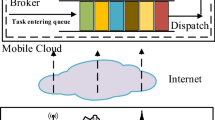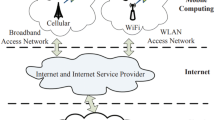Abstract
The utility of mobile applications has been increased enormously due to the advancements in science and technology to assist the users for various purposes. The main intention of integrating cloud services and resources with the mobile application is to reduce battery usage and to improve the efficiency of mobile devices. Thus the process of shifting a task that can be run on the cloud resources for assistance is referred to as task offloading. The process of task offloading is critical in the field of Mobile Cloud Computing. The major issue that pairs with task offloading are the communication cost estimation of the devices. To overcome the above-mentioned issues and to create an effective task offloading model, A Novel Mobile Cloud Computing framework called Rule Generation based Energy Estimation Model (RG-EEM) is designed. The energy required for executing the task in the local mobile device and cloud is estimated by implementing an energy estimation algorithm. Then a novel constraints specific rule generation algorithm is used to estimate the task execution time and memory utilization of the task, from which the decision has to be taken for offloading or local execution by considering all the possible affecting characteristics. Further, a novel task clustering and scheduling algorithm are implemented to execute the task in the cloud server effectively which will help in allocating similar tasks to a particular virtual machine in the cloud. The RG-EEM algorithm will also help in partitioning the task and parallel execution. The effectiveness of the RG-EEM technique is evaluated using the parametric measures and compared with the existing techniques.






Similar content being viewed by others
References
Akherfi K et al (2018) Mobile cloud computing for computation offloading: issues and challenges. Appl Comput Inform 14(1):1–16
Altamimi M et al (2015) Energy cost models of smartphones for task offloading to the cloud. IEEE Trans Emerg Top Comput 3(3):384–398
Cardellini V et al (2016) A game-theoretic approach to computation offloading in mobile cloud computing. Math Progr 157(2):421–449
Chen M-H et al (2016) Joint offloading decision and resource allocation for multi-user multi-task mobile cloud. In: Communications (ICC), 2016 IEEE international conference on, IEEE
Dinh TQ et al (2017) Offloading in mobile edge computing: task allocation and computational frequency scaling. IEEE Trans Commun 65(8):3571–3584
Erana Veerappa Dinesh S (2017) EDTOS: energy-aware dynamic mobile task offloading and scheduling model in mobile cloud computing. Int J Adv Res Trends Eng Technol IJARTET 4(1):41–47
Gu L et al (2019) Energy efficient task allocation and energy scheduling in green energy powered edge computing. Future Gener Comput Syst 95:89–99
Guo S et al (2016). Energy-efficient dynamic offloading and resource scheduling in mobile cloud computing. In: INFOCOM 2016-the 35th annual IEEE international conference on computer communications, IEEE, IEEE
Hao Y et al (2018) Energy efficient task caching and offloading for mobile edge computing. IEEE Access 6:11365–11373
Huynh LN et al (2020) Efficient computation offloading in multi-tier multi-access edge computing systems: a particle swarm optimization approach. Appl Sci 10(1):203
Jararweh Y et al (2016) The future of mobile cloud computing: integrating cloudlets and mobile edge computing. In: 2016 23rd international conference on telecommunications (ICT), IEEE
Kaur P, Mehta S (2019) Efficient computation offloading using grey wolf optimization algorithm. In: AIP conference proceedings, AIP Publishing LLC
Kero A et al (2019) An adaptive approach towards computation offloading for mobile cloud computing. Int J Inf Technol Web Eng IJITWE 14(2):52–73
Liu C-F et al (2017) Latency and reliability-aware task offloading and resource allocation for mobile edge computing. arXiv preprint arXiv:1710.00590
Manikandan J et al (2019) Collaborative task execution for application as a general topology in mobile computing under communication cost model. Int Res J Eng Technol (IRJET) 6(10):1335–1340
Manukumar ST, Muthuswamy V (2019) A novel multi-objective efficient offloading decision framework in cloud computing for mobile computing applications. Wirel Pers Commun 107(4):1625–1642
Mao Y et al (2017) Joint task offloading scheduling and transmit power allocation for mobile-edge computing systems. In: Wireless communications and networking conference (WCNC), 2017 IEEE, IEEE
Pan S et al (2019) Dependency-aware computation offloading in mobile edge computing: a reinforcement learning approach. IEEE Access 7:134742–134753
Pu L et al (2016) D2D fogging: an energy-efficient and incentive-aware task offloading framework via network-assisted D2D collaboration. IEEE J Sel Areas Commun 34(12):3887–3901
Qian H, Andresen D (2015) Reducing mobile device energy consumption with computation offloading. In: Software engineering, artificial intelligence, networking and parallel/distributed computing (SNPD), 2015 16th IEEE/ACIS international conference on, IEEE
Ragona C et al (2015) Energy-efficient computation offloading for wearable devices and smartphones in mobile cloud computing. In: Global communications conference (GLOBECOM), 2015 IEEE, IEEE
Shiraz M et al (2015) Energy efficient computational offloading framework for mobile cloud computing. J Grid Comput 13(1):1–18
Tran TX, Pompili D (2017) Joint task offloading and resource allocation for multi-server mobile-edge computing networks. arXiv preprint arXiv:1705.00704
Wang J et al (2019a) Edge cloud offloading algorithms: issues, methods, and perspectives. ACM Comput Surv CSUR 52(1):1–23
Wang K et al (2019b) Learning-based task offloading for delay-sensitive applications in dynamic fog networks. IEEE Trans Veh Technol 68(11):11399–11403
Yousafzai A et al (2019) Process migration-based computational offloading framework for IoT-supported mobile edge/cloud computing. In: IEEE internet of things journal
Zhao Y et al (2015) Energy-efficient task offloading for multiuser mobile cloud computing. In: Communications in China (ICCC), 2015 IEEE/CIC international conference on, IEEE
Zhou B et al (2018) An online algorithm for task offloading in heterogeneous mobile clouds. ACM Trans Internet Technol TOIT 18(2):23
Author information
Authors and Affiliations
Corresponding author
Additional information
Publisher's Note
Springer Nature remains neutral with regard to jurisdictional claims in published maps and institutional affiliations.
Rights and permissions
About this article
Cite this article
Erana Veerappa Dinesh, S., Valarmathi, K. A novel energy estimation model for constraint based task offloading in mobile cloud computing. J Ambient Intell Human Comput 11, 5477–5486 (2020). https://doi.org/10.1007/s12652-020-01903-5
Received:
Accepted:
Published:
Issue Date:
DOI: https://doi.org/10.1007/s12652-020-01903-5




